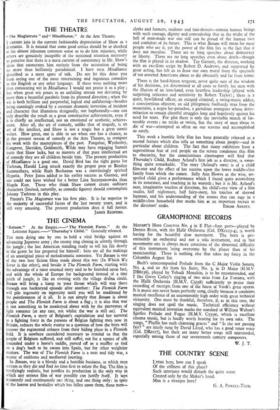" Bataan." At the Empire. -- 46 The Flemish Farm." At
the. Leicester Square.—“ Thursday's Child." Generally released.
THE CINEMA
" Bataan." At the Empire. --46 The Flemish Farm." At the. Leicester Square.—“ Thursday's Child." Generally released.
TEN men dying one by one to hold a vital bridge against an advancing Japanese army ; the enemy ring dosing in silently through the jungle ; the last American standing ready to sell his life dearly in the grave he has prepared for himself ; here are all the makings of an unoriginal piece of melodramatic nonsense. Yet Bataan is one of the two best fiction films made about this war (in Which We Serve is the other), and beside it The Flemish Farm, starting with the advantage of a most unusual story said to be founded upon fact, and with the whole of Europe for background instead of a tiny patch of jungle, is like an evening with the village dra-ma circle. Bataan will bring a lump to your throat which will stay there through one hackneyed episode after another : The Flemish Farm will pile ingenuity on ingenuity until you will be maddened by the pointlessness of it all. It is not simply than Bataan is about people and The Flemish Farm is about a flag ; it is also that war is not something to be monkeyed. about with by the purveyors of light romance (at any rate, not whilst the war is still on). The Flemish Farm, a story of Belgium's capitulation and her survival as a fighting force in the persons of Belgian fighting men now in Britain, reduces the whole matter to a question of how the boys will recover the regimental colours from their hiding place in a Flemish field. It is nowhere considered necessary to remind us that the people of Belgium suffered, and still suffer, not for a square of silk concealed under a horse's saddle, passed off as a muffler or tied on a dog's back to be swum into Spain, but for other weightier matters. The war of The Flemish Farm is a neat and tidy war, a matter of emblems and mediaeval jousting.
In Bataan, war is a bloody and a horrible business, in which men scream as they die and find no time first to salute the flag. The film is terrifyingly realistic, but justifies its production in the only way in which any serious film of war possibly- can justify itself. It says insistently and continuously one thing, and one thing only: in spite of the horror and bestiality which has fallen mon them, these men—
clerks and farmers, students and taxi-drivers—remain human beings with such courage, dignity and comradeship that in the midst of the hell of man-made war one still can be proud of the human race and confident of its future. This is what Bataan will mean for most people who see it, yet the power of the film lies in the fact that it does not moralise. There are no long speeches about democracy or liberty. There are no long speeches even about death—though the film is played in its shadow. Tay Garnett, the director, working with an excellent script by Robert D. Andrews, and supported by great acting, has left us to draw our own moral from the spectacle of ten assorted Americans about to die obscurely and far from home.
There is the hard-bitten sergeant, never quite sure of the wisdom of his decisions, yet determined at all costs to fortify his men with the. illusion of an iron-hand, even heartless leadership (played with surprising reticence and sensitivity by Robert Taylor); there is a quiet, bewildered officer, an escaped criminal, a swing-music addict, a conscientious objector, an old phlegmatic foolhardy man from the mountains, a negro lay-preacher, a garrulous youngster whose deter- mination to remain cheerful struggles long and hopelessly against his need for tears. For plot there is only the inevitable march of for- seeable events ; no tricks or twists, but the story of men about to die of war—attempted so often on our screens and accomplished so rarely.
This week a humble little film has been generally released as a second feature which also tells us something about people—and in particular about children. The fact that many exhibitors have a superstitious fear of real people on the screen condemns this film to obscurity, but the conscientious cinemagoer will find that Thursday's Child, Rodney Acland's first job as a director, is some- thing quite remarkable. The story (Adand's own) is of a child film-star and the effect of her success upon the lower middle-class family from which she comes. Sally Ann Howes as the wise, un- spoiled child gives a performance which I found quite astonishing in its assurance, and touching in its warmth • but it is Mr. Acland's neat, imaginative touches of direction, his child's-eye view of a film studio, half nightmare, half fairy-story, his touches of shrewd humour, and his understanding of the storms that can rage in a middle-class household that marks him as an important recruit to


























 Previous page
Previous page